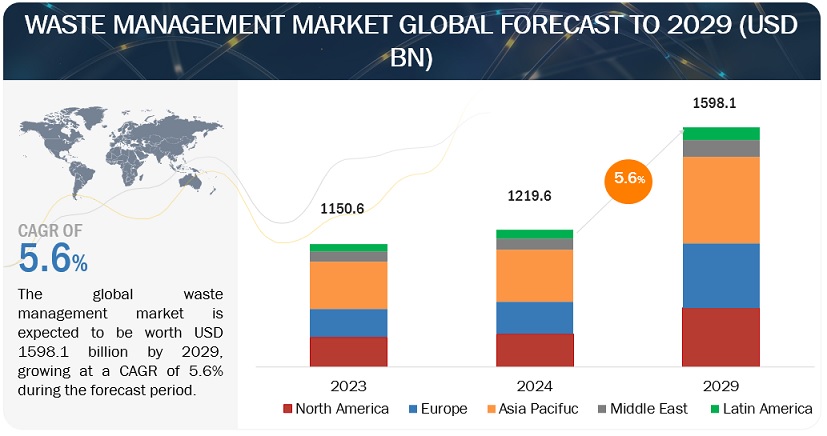According to a research report “Waste Management Market by Waste Type (Hazardous Waste, E-Waste, Municipal Solid Waste, Medical Waste, Construction & Demolition, Non-Hazardous Industrial Waste), Disposal (Open Dumping, Incineration/Combustionl), Source & Region – Global Forecast to 2029″ published by MarketsandMarkets, the global Waste Management Market is projected to reach USD 1598.1 billion by 2029 from an estimated USD 1219.6 billion in 2024, at a CAGR of 5.6% during the forecast period.
Waste management is an important process that includes the collection, transportation, disposal, and recycling of waste materials. Effective waste management is critical to ensuring environmental sustainability, public health, and resource conservation. Sustainable waste management practices not only help in reducing pollution but also create opportunities for economic growth through the development of recycling industries and job creation in the waste management sector. Proactive government actions, technical improvements, and an increase in e-waste output are all key drivers of this expansion. Waste Management, Suez, Veolia, and others are major players in the waste management market, with methods such as corporate development and alliances being implemented to improve services.
Download PDF Brochure: https://www.marketsandmarkets.com/pdfdownloadNew.asp?id=72285482
Non-Hazardous Industrial Waste, by waste type is expected to be the largest segment during the forecast period.
Based on waste type, the waste management market is categorized into six categories: Hazardous Waste, E-Waste, Municipal Solid Waste, Medical Waste, Construction & Demolition, Non-Hazardous Industrial waste. The Non-Hazardous Industrial waste is expected to be the largest segment. Non-Hazardous Industrial waste encompasses materials that become unusable during manufacturing processes in sectors like factories, mills, and mining. This waste can be solid, semi-solid, or liquid, containing substances such as dirt, gravel, concrete, scrap metal, oil, chemicals, and even organic matter from restaurants. Globally, Non-Hazardous industrial waste production is significant, with the US generating an estimated 7.6 billion tons annually, ranking first globally followed by China. Developing countries like China see a rise in industrial waste generation, while countries like India witness increasing demand for waste management services.

Recycling , by Disposal method, is expected to be the fastest growing segment during the forecast period.
Based on the Disposal method, the waste management market is segmented into six categories: Open Dumping, Incineration/Combustion, Landfill, Recycling, Composting & Anaerobic Digestion. Recycling is the fastest growing segment by disposal method. Recycling is the process of collecting and processing materials that would otherwise be thrown away as trash and turning them into new products. Recycling is crucial for managing waste sustainably. It helps save resources, reduce pollution, and create jobs. By recycling materials like paper, plastic, and glass instead of throwing them away, it helps to conserve energy, cut down on greenhouse gas emissions, and protect the environment. Recycling also supports the economy by generating income from selling recycled materials and encouraging innovation. The key advantages of recycling and recovery are reduced quantities of disposed waste and the return of materials to the economy. In many developing countries, informal waste pickers at collection points and disposal sites recover a significant portion of discards.
North America is expected to be the largest region in the waste management market.
The dense population and rapid urban development in the area result in a notable volume of waste from residential, commercial, and industrial activities. This situation necessitates the implementation of comprehensive waste management systems and infrastructure. Moreover, the United States, being the largest contributor to waste due to its population size, generates a significant portion of the world’s municipal solid waste. In North America, the waste management sector benefits from efficient industrial waste management techniques, an increasing focus on environmental cleanliness, and the primary industrial sectors such as electricity, pharmaceuticals, and oil and gas, which are major consumers of waste management services. Stringent government regulations in the U.S. and Canada have spurred the collection and disposal of industrial waste, further stimulating the waste management industry in the region. It has headquarters of many big waste management companies such as WM Intellectual Property Holdings, L.L.C. (US), Republic Services (US) & Waste Connections (US).
Request Sample Pages: https://www.marketsandmarkets.com/requestsampleNew.asp?id=72285482
Key Players
Some of the major players in the waste management market are WM Intellectual Property Holdings, L.L.C. (US), Suez (France), Veolia (France), Republic Services (US) & Waste Connections (US) are the market leaders in the Waste management market. The major strategies adopted by these players include new product launches, acquisitions, contracts, agreements, partnerships, joint ventures, collaborations, investments, and expansions.
